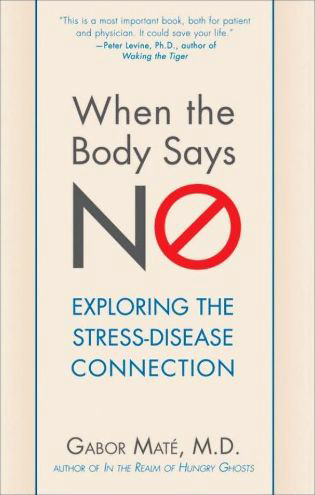Part of the Casswiki article series Books

When the Body Says No is a book by Gabor Maté which explores the connection between chronic stress and illness. It was first published in 2003.
This book describes how, in ignoring or otherwise neglecting stress – in failing to “say no” and take care of ourselves – eventually our bodies “say no” for us. Maté makes clear the importance of the mind-body connection, in exploring case studies of terminal illnesses and relating them both to the findings of psychoneuroimmunology and to the collective experience of medical professionals.
Emotion and stress are biochemically connected to the immune system and the endocrine system. Suppression of emotion affects the immune system, which can give cancer the chance to grow, or trigger an autoimmune disease. Emotional hyperexpression (e.g. constant outbursts of anger) can likewise be problematic, in maintaining a state of chronic stress.
Through childhood experiences as well as cultural programming, we can easily form habits that are likely to lead to illness and/or premature death. In this, we are supported by a culture which idealizes overexertion, workaholism, and “niceness” rooted in repression of anger. Many of us learn to use all manner of justifications (lying to ourselves) to refrain from “saying no”, and this book can be quite an eye-opener.
The initial problem of not setting healthy boundaries and not acknowledging one’s own emotions can have several causes. One among these is narcissistic wounding, as explored in The Narcissistic Family by Donaldson-Pressman and Pressman. But the socio-cultural roots of stress-induced illness and death, while including this common problem, also go beyond it.
The one really important thing that this book misses in relation to stress and illness is the role that diet can play. It’s not either-or: both are important with regard to health, and neither should be neglected. Sorting out one’s diet can help reduce inflammation, stabilize brain chemistry, and increase ability to handle stress. It can both help with a variety of health problems (including autoimmune diseases) and have psychological benefits. (Proper nutrition is particularly important for brain health.) But neither approach is a substitute for the other; the two approaches go hand in hand, and if you’re unfamiliar with one or both of them, looking into them is strongly recommended.
See also
- Mind-body connection
External links
- Dr. Gabor Maté: “When the Body Says No: Understanding the Stress-Disease Connection” (Amy Goodman of Democracy Now interviews Gabor Maté about When the Body Says No. Video and transcript.)
- Cassiopaea Forum: When the Body Says No (Discussion, excerpts, and videos of some of Gabor Maté’s talks about the book and other subjects he has written about.)
